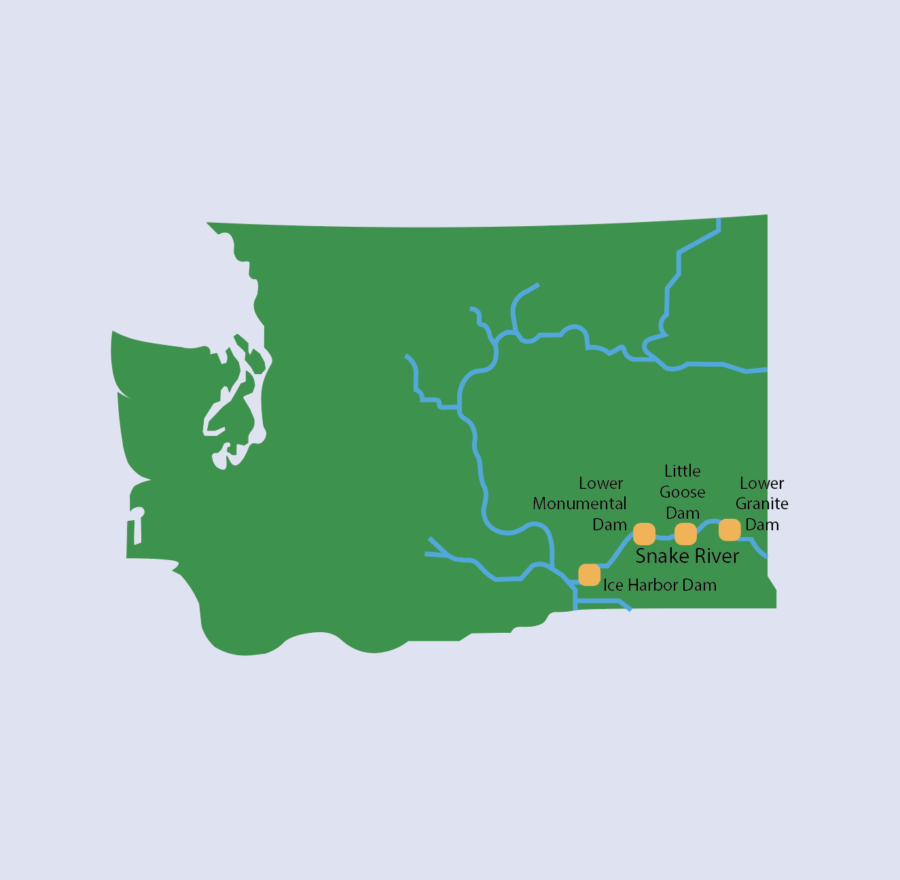ENVIRONMENT
Little green lies: corporations wash over sustainability movements through greenwashing
by Charlotte Fishburne, Redwood Bark (Redwood High School - Larkspur, CA)
Browsing the supermarket, consumers are blinded by sustainability buzzwords from products claiming to be “carbon neutral,” “eco-friendly” and “biodegradable.” These labels are quick to overwhelm, as it turns what should be a simple shopping choice into an ethical dilemma of how far customers should go to do their part for the planet. It appears to be a consumer’s responsibility to fix climate change and the world’s overconsumption through the products they buy.
Major corporations are contributors to guilting buyers by using sustainability as a…
Protect the salmon, remove the dams
by Cate Bouvet (she/her) and Klaira Zhang (she/her), Inglemoor High School Nordic News (Kenmore, Washington)
Before the 1900s, the Columbia River Basin produced between 10 million and 16 million salmon annually, but this number has dwindled to an average of 660,000 in recent years. One factor behind this decline lies within the hydroelectric dams on the Columbia River Basin. The basin supports all five species of salmon that live in North American waters, including Chinook, Coho, Sockeye, Steelhead and Chum.
On July 11, the National Oceanic and Atmospheric Administration (NOAA) released a report that recommended four out of the 18 dams be removed for the sake of local wildlife. Last month, Gov. Jay Inslee (he/him) and Sen. Patty Murrary (she/her) concluded that the Lower Snake River dams will not be breached unless they are presented with an feasible option of doing so that will ensure the benefits the dams provide don’t outweigh their cause for removal.
Consuming meat is decimating our planet
by Alexa Ballesteros, Van Nuys High School Mirror (Los Angeles, California)
The overconsumption of meat is one of the most unfortunate things happening to the planet.
Overconsumption is causing deforestation and climate change, which are arguably two of the worst things you can do to the planet.
Forests provide us with oxygen, we need them, not only to emit oxygen but also to take in carbon dioxide. Due to the high demand for meat, forests have been cut down in order to make space for massive cattle pastures. Beef agriculture alone is responsible for 41% of tropical deforestation.
Staying on trend isn’t worth the economic and environmental damage
by Alison Mitchell, St. Paul Academy and Summit School Rubicon (St. Paul, Minnesota)
Every week on Tiktok there seems to be a new trending aesthetic, ranging from the edgier punk rock, streetwear baddie, and gothcore, to the lighter barbiecore, coastal grandmas, and coconut girl. And while these new trends may bring exciting fashion inspiration and fun “must-have” clothing items, the practice of over-consumption promoted by the current trend cycle isn’t just unsustainable, it’s economically unfair.
It doesn’t take a fashion expert or a trend analyst to realize that these aesthetic trends seem to be going in and out of style at a faster pace. Traditional fashion trends tend to stick around for a few years, but these new “micro trends” rise to popularity quickly before going out of style after just a few months. Despite the fact that these micro trends don’t stick around for long, influencers jump on every new trend, using their platforms to promote this month’s hot new “must haves”…
The disgusting truth
by Quinn Brown, Blue Valley Northwest Highschool Express (Overland Park, Kansas)
Last year, when I made the long trek across the Commons after lunch, I vividly remember stepping on half-used ketchup packets and ruining my converse. I looked down and saw other condiments, bread, utensils, wrappers and fruit strewn across the tile floor.
The Atrium was no better. Its tables partially concealed the litter, but it was nonetheless scattered with trash as well. Do we want to represent ourselves as a school like this? We need to do a better job of cleaning up after ourselves. We do not want to burden our custodial staff with picking up our messes.
If we want privileges to be considered by the new administration, we need to take responsibility for the state in which we…




